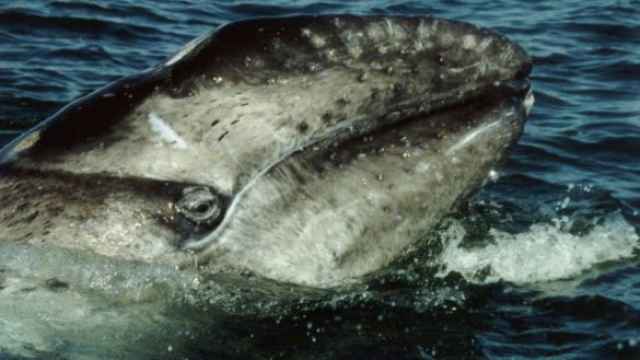ANCHORAGE, Alaska — A highly endangered whale is making good time as it continues its journey east from Russian waters toward Alaska.
U.S. and Russia researchers have tracked the 13-year-old male western Pacific gray whale to a location about 130 kilometers north of St. Paul Island, part of Alaska's Pribilof Islands in the Bering Sea.
Bruce Mate, director of Oregon State University's Marine Mammal Institute, said the whale was detected there Thursday. Foul weather has hampered updates from the satellite-monitored radio tag affixed to the whale by researchers in September.
"The weather out there is really crummy," he said.
Researchers have been tracking the whale since they tagged it off Russia's Sakhalin Island. They had hoped to tag 12 western Pacific gray whales but were limited to one, on the last day of field work, by typhoons and gales.
Western Pacific gray whales are the second-most threatened species of large whale after North Pacific right whales. Just 130 of the animals remain. They spend summers near Sahkalin Island at the south end of the Sea of Okhotsk, but little is known of their winter habits.
In contrast, eastern Pacific gray whales number about 18,000 animals. They breed and give birth in warm water, mostly along Baja California, and migrate north to spend summers on feeding grounds in Alaska's Bering, Chukchi and Beaufort seas.
Part of what's surprising about the tagged whale is that it's swimming faster than the eastern north Pacific population migrating south this time of year — about 4 kilometers per hour.
"Here he is at a little more than 7.2 kilometers an hour, and over an extended period of time," Mate said. "He appears to be highly motivated."
Dubbed "Flex," the whale left Russia's Kamchatka Peninsula coast Jan. 3 and swam east. By Jan. 9, it had swum 1,200 kilometers to the edge of the Bering Sea shelf north of the Aleutians, where waters decrease in depth from about 3,960 meters to about 72 meters.
The whale swam another 480 kilometers east last week to the location north of the Pribilofs. The whale then turned south.
The tag remains on the whale, Mate said, but if it surfaces in a trough between 9-meter waves, the satellite may not receive enough signals to pinpoint the whale's location by measuring shifts in frequency.
"We do get individual messages, but those aren't enough to determine location," he said.
Scientists have been monitoring Flex since he showed up as a calf with his mother in 1997. It's unknown if the whale has company on its journey, but baleen whales generally do not travel together.
Mate is eager to confirm Flex's new location. If it continued south, the whale could be in the Aleutian Islands by now.
"That's part of the excitement as a scientist, when we do something like this, is that next to God and the whale, I'm the next one to know," he said. "I look forward to each daily episode as a new chapter in surprise and excitement."
The public can track the whale on Oregon State's website. It's updated every Monday.
A Message from The Moscow Times:
Dear readers,
We are facing unprecedented challenges. Russia's Prosecutor General's Office has designated The Moscow Times as an "undesirable" organization, criminalizing our work and putting our staff at risk of prosecution. This follows our earlier unjust labeling as a "foreign agent."
These actions are direct attempts to silence independent journalism in Russia. The authorities claim our work "discredits the decisions of the Russian leadership." We see things differently: we strive to provide accurate, unbiased reporting on Russia.
We, the journalists of The Moscow Times, refuse to be silenced. But to continue our work, we need your help.
Your support, no matter how small, makes a world of difference. If you can, please support us monthly starting from just $2. It's quick to set up, and every contribution makes a significant impact.
By supporting The Moscow Times, you're defending open, independent journalism in the face of repression. Thank you for standing with us.
Remind me later.





